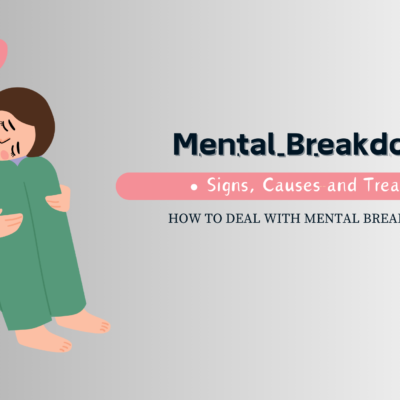Mental Breakdown- Signs, Causes and Treatment: In the fast-changing world we are living in, mental health has become an increasingly relevant topic of discussion. Among the myriad of mental health issues that people face, a mental breakdown stands out as a painful and usually misunderstood phenomenon. Identifying the signs and understanding the underlying causes of mental breakdowns are important steps toward fostering a supportive environment for those who may be experiencing such challenges.
Also Read:
- Benefits of Walking in Nature on Mental Health.
- Some Natural Mood Enhancers for Depression.
- Signs You Have Working From Home Depression.
- How to Stop Feeling Like Life is Pointless?
- Why Do People Shut Down Emotionally?
What is a Mental Breakdown?
A mental breakdown is an emotional breakdown, an extreme period of psychological distress during which a person may feel overwhelmed and unable to deal with the needs of life. It is indicated by a sudden decline in one’s ability to work effectively in daily activities, usually accompanied by feelings of extreme anxiety, despair, and hopelessness.
Signs of a Mental Breakdown
Recognizing the signs of a mental breakdown is important for early intervention and consent. While symptoms may vary from person to person, here are some common signs include:
Intense Emotional Distress: People may experience overwhelming emotions such as sadness, anxiety, anger, or discomfort that seem to consume their thoughts and actions.
Physical Symptoms: Physical indications such as fatigue, insomnia, headaches, muscle tension, and gastrointestinal issues may accompany the psychological distress.
Social Withdrawal: A wish to isolate oneself from friends, family, and social activities may arise as people struggle to deal with their emotions.
Impaired Cognitive Functioning: Problems concentrating, making decisions, or remembering things may happen as a result of heightened stress and anxiety.
Changes in Behavior: Sudden changes in behavior, such as increased irritability, agitation, or impulsivity, may signal underlying psychological distress.
Loss of Interest: A loss of interest or pleasure in activities once enjoyed, along with a sense of detachment from reality, may signify a mental breakdown.
Causes of Mental Breakdowns
The causes of mental breakdowns are multifaceted and usually arise from a combination of biological, psychological, and environmental factors. Here are some common causes of mental breakdowns:
Chronic Stress
Prolonged exposure to high levels of stress, whether from work, relationships, financial pressures, or other sources, can dominate the body and mind, raising the risk of a mental breakdown.
Traumatic Events
Traumatic experiences such as abuse, loss of a loved one, accidents, or natural disasters can activate intense emotional reactions and contribute to mental health crises.
Underlying Mental Health Disorders
People with pre-existing mental health conditions such as depression, anxiety disorders, bipolar disorder, or post-traumatic stress disorder (PTSD) may be more susceptible to experiencing a mental breakdown during times of increased stress.
Substance Abuse
The misuse of drugs or alcohol can worsen underlying mental health issues and contribute to the beginning of a mental breakdown.
Personal Crisis
Significant life changes such as divorce, job loss, financial instability, or serious illness can disrupt one’s sense of identity and security, leading to emotional disruption.
Genetic Inclination
A family history of mental illness or genetic inclination to certain psychiatric disorders may increase a person’s vulnerability to experiencing a mental breakdown.
Coping Mechanisms and Treatment Options
When facing a mental breakdown, seeking professional help and using healthy coping tools are important steps towards recovery. Some useful strategies include:
Therapy
Psychotherapy, such as cognitive-behavioral therapy (CBT), dialectical behavior therapy (DBT), or interpersonal therapy, can help people identify and address underlying issues contributing to their distress.
Medication
In some cases, medication may be defined to ease symptoms of anxiety, depression, or other mental health disorders connected with a mental breakdown.
Self-Care Practices
Engaging in self-care activities such as exercise, meditation, mindfulness, and relaxation techniques can help relieve stress and boost emotional well-being.
Take Help from People Around
Connecting with supportive friends, family members, or support groups can provide emotional validation and practical help during difficult times.
Healthy Lifestyle Changes
Adopting a balanced diet, getting enough sleep, and avoiding substance abuse can help improve overall mental and physical health.
Setting Boundaries
Learning to assertively communicate personal boundaries and prioritize self-care can stop burnout and decrease the risk of future mental breakdowns.
At The End
Mental breakdowns are complicated phenomena that can highly affect a person’s well-being and functioning. By identifying the signs and understanding the underlying causes of mental breakdowns, we can better support those in need and encourage their journey toward recovery.
Through access to timely intervention, effective treatment options, and a supportive community, people can emerge from mental breakdowns stronger and more resilient than before. Let us aim to promote a world where mental health is prioritized, and everyone feels empowered to seek the help they deserve.








